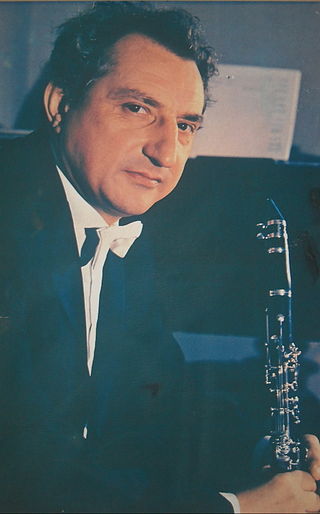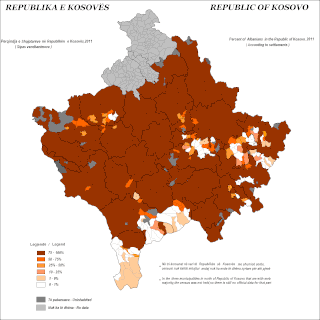Related Research Articles

Kosovo, officially the Republic of Kosovo, is a landlocked country in Southeast Europe with partial diplomatic recognition. It is bordered by Albania to the southwest, Montenegro to the west, Serbia to the north and east and North Macedonia to the southeast. It covers an area of 10,887 km2 (4,203 sq mi) and it has a population of approximately 1.6 million. Kosovo has a varied terrain, with high plains along with rolling hills and mountains, some of which reach an altitude of over 2,500 m (8,200 ft). Its climate is mainly continental with some Mediterranean and alpine influences. Kosovo's capital and the most populous city is Pristina; other major cities and urban areas include Prizren, Ferizaj, Gjilan and Peja.
Music of Kosovo is music that originates from Kosovo, a country in the Balkans. Kosovo's population is mainly Kosovo Albanians, also known as Kosovars, and there are various minority ethnic groups as well. Kosovan music is closely related to that of neighbouring Albania, as well as to that of countries in the former Yugoslavia.

Milenko Stefanović was a Serbian classical and jazz clarinetist. He was a prizewinner in the international competitions in Moscow, Munich, Geneva and Prague, and achieved an international career as a soloist. He was a long-time principal clarinetist of the Belgrade Philharmonic Orchestra and Professor of Clarinet at the University of Priština and University of the Arts in Belgrade.

The Albanians of Kosovo, also commonly called Kosovo Albanians, Kosovan Albanians or Kosovars, constitute the largest ethnic group in Kosovo.

Kosovo Serbs are one of the ethnic groups of Kosovo and they form the largest ethnic minority community in Kosovo (5–6%). The precise number of Kosovo Serbs is difficult to determine as they have boycotted national censuses. However, it is estimated that there are about 95,000 of them, nearly half of whom live in North Kosovo. Other Kosovo Serb communities live in the Southern municipalities of Kosovo.

The University of Pristina is a public university located in Pristina, Kosovo. It is the institution that emerged after the disestablishment of the University of Pristina (1969–1999) as a result of the Kosovo War. The inauguration of the university was a historical occurrence not only for the people of Kosovo, but for the whole Albanian nation. On 15 February, the solemn Parliament session took place, which is also proclaimed as The University of Pristina's Day. In the composition of the newly established University of Pristina were faculties with their headquarters in Pristina: the Faculty of Philosophy, Faculty of Law and Economics, Faculty of Engineering and Faculty of Medicine. Now the University of Pristina has 17 faculties, of which 14 are academic faculties and 3 are faculties of applied sciences. Contained within the emblem is a translation of the name into Latin, Universitas Studiorum Prishtiniensis.
Akil Mark Koci is a Kosovar Albanian composer and music writer.

Marija Gluvakov – Medenica, is a Serbian pianist and piano teacher.

Pristina is the capital and largest city of Kosovo. It is the administrative center of the eponymous municipality and district.

The Autonomous Province of Kosovo and Metohija, commonly known as Kosovo and abbreviated to Kosmet or KiM, is an autonomous province defined by the Constitution of Serbia that occupies the southernmost part of Serbia. The territory is the subject of an ongoing political and territorial dispute between the Republic of Serbia and the partially recognised Republic of Kosovo. Its claimed administrative capital and largest city is Pristina.
The International Festival of Young Musicians – DAM Festival Pristina is one of the most prominent cultural events taking place in the capital city of Kosovo, Pristina. Founded in 2006, DAM Festival is an annual music festival which gathers young and talented national and international musicians from all over the world. This festival works on enriching the Kosovar cultural scene with the collision of the traditional and the contemporary. DAM Fest was founded by back then art student, now well known TV producer, musician, journalist and manager of Kosovo's Philharmonic Orchestra, Dardan Selimaj.

Marko Nešić is a Serbian conductor, composer, Assistant Professor – Docent of Orchestration and Vice Dean at the Faculty of Arts of Priština-Zvečan and teacher at the Grand School of Music "dr Miloje Milojević", Kragujevac.
Lorenc Antoni was an Albanian composer, conductor, and ethnomusicologist.
Esad Mekuli was an Albanian poet, critic and translator. He was the first president of the Academy of Sciences and Arts of Kosovo. Robert Elsie considered him the father of modern Albanian poetry in Yugoslavia, and his influence in Kosovo remains immense.

The University of Pristina was founded in the Socialist Autonomous Province of Kosovo, Socialist Republic of Serbia, Yugoslavia, in the city of Pristina, for the academic year 1969–1970 and functioned until 1999. However, owing to political upheaval, war, successive mutual expulsions of faculty of one ethnicity or the other, and resultant pervasive ethnic-based polarisation, there came to be two disjoint institutions using the same name, albeit idiosyncratically to reflect ethnic identity. Albanian-language activity continues at the original location, whilst the Serbian-language University of Priština has relocated to North Mitrovica, where it maintains its place within the Serbian education system.
Classical music in Kosovo refers to the art music cultivated in Kosovo. The roots of classical music in Kosovo are found in the 1940s and include the time period from the times when Kosovo was part of Yugoslavia to this day. It can be said that there is a tradition of classical music in Kosovo, however, compared to other Balkan countries and especially European countries this tradition is younger. Classical music in Kosovo reaches back about 70 years. Even though in a short period of time, this music has evolved, passing through generations of composers and artists. In his book Albanian: Zhvillimi i stileve në veprat e kompozitorëve shqiptarë të Kosovës, Engjëll Berisha comments:
The diversity of styles in Albanian music [of Kosovo], its national patterns with sound idea-aesthetic foundations are a characteristic of the European musical reality, so many many works are of interest abroad, too, because during this relatively short period Albanian classical music in Kosovo has compensated for the delay in its development.
In March and April 1981, a student protest in Pristina, the capital of the then Socialist Autonomous Province of Kosovo, led to widespread protests by Kosovo Albanians demanding more autonomy within the Socialist Federal Republic of Yugoslavia. The Presidency of Yugoslavia declared a state of emergency in Pristina and Kosovska Mitrovica, which led to rioting. The unrest was suppressed by a large police intervention that caused numerous casualties, and a period of political repression followed.

As the capital city of Kosovo, Pristina is the heart of the cultural and artistic development of all Albanians that live in Kosovo. The department of cultural affairs is just one of the segments that arranges the cultural events, which make Pristina one of the cities with the most emphasized cultural and artistic traditions.
Music composition and composers in Pristina refers to music composition and composers who have left their mark in Pristina. The importance of Kosovan Folklore on the different genres, their development and their popularity. As referring to genres as a categorization would not cover all compositions and composers in a fair way, a highlight of every composers work and different genres is provided because of the different genres a composers work has included throughout the years.
References
- ↑ "Vdiq kompozitori i shquar dhe ish-profesori universitar Fahri Beqiri". Koha. 18 May 2021. Retrieved 12 September 2024.
- ↑ "Vdes kompozitori i njohur Fahri Beqiri". Bota Sot. 18 May 2021. Retrieved 8 September 2023.